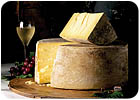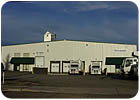Kehler is a co-founder of Jasper Hill Farm, where cheese is made by hand from the milk of 35 Ayrshire cows. Davis works for Cabot/McCadam, the processing subsidiary of Agri-Mark Inc., cooperative. That operation sold $760 million worth of cheese and other dairy products in 2004. Nonetheless, 38-lb Cheddar wheels from Cabot's Montpelier, Vt. plant are traveling a couple counties over to Jasper Hill in Greensboro, where Kehler wraps them in cloth and places them on wooden shelves in an underground cheese cave. There they will age anywhere from 10 to 18 months to develop rich, complex flavors and textures.

Mateo Kehler and Jed Davis inhabit different planets in the cheese galaxy.
Kehler is a co-founder of Jasper Hill Farm, where cheese is made by hand from the milk of 35 Ayrshire cows. Davis works for Cabot/McCadam, the processing subsidiary of Agri-Mark Inc., cooperative. That operation sold $760 million worth of cheese and other dairy products in 2004. Nonetheless, 38-lb Cheddar wheels from Cabot's Montpelier, Vt. plant are traveling a couple counties over to Jasper Hill in Greensboro, where Kehler wraps them in cloth and places them on wooden shelves in an underground cheese cave. There they will age anywhere from 10 to 18 months to develop rich, complex flavors and textures.
The resulting product, Cabot's Vermont Clothbound Cheddar starts with small batches using the pasteurized milk of a single herd of Holsteins. A proprietary blend of cultures and Jasper Hill's affinage (the craft of storing and aging the cheese), results in a cheese with the complexity of raw milk Cheddar made with the milk traditional breeds.
"It's an unlikely partnership, but it's worked out extremely well," Kehler says. "Cabot is demonstrating that they are not so big that they cannot make an artisan product that can stand on its own in the best retail shops in the country, and we can get them into places they can't get to on their own."
It was Cabot who initiated the partnership after getting to know Jasper Hill through the Vermont Cheese Council.
"For 10 years or more we have attempted to make a natural rind Cheddar," says Davis, Cabot's dir. of marketing. "The biggest problem for us is that in making a natural-rind Cheddar you naturally encounter some mold or mites, and we didn't want any of that anywhere near our regular cheddars.
Both men say the partnership has offered mutual benefits. It helps Jasper Hill increase its volume and broaden its portfolio (Jasper Hill markets the cheese, with both companies getting billing on the label), while the project offers Cabot deeper penetration into the lucrative and growing specialty cheese market.
The partnership with Cabot will allow Jasper Hill to grow even faster. It will begin blasting this month in order to quadruple its underground storage, and its staff will likely double this year.

Goat cheese, please
The story of what Kehler and Davis are doing may ring familiar among other American artisan cheese makers. Many are growing their sales by leaps and bounds while learning to manage supply and demand. Some are ramping up their plants and expanding affinage and storage space to meet the growing demand, and some are working with a growing number of distributors to enter new markets. Some are doing all of these things.Jasper Hill is less than four years old. It has six full-time and two part-time employees. Its herd will soon be expanded to 45 cows. That makes it one of the larger farmstead cheese manufacturers in Vermont, but it is still quite young and quite small in comparison to the full gambit of American artisan, specialty, and farmstead cheese companies which have cropped up in all corners of the country in the past two decades. For the most part those who have been the business for more than 10 years are considered veterans, and any company with more than 20 employees has achieved some heft.
Cypress Grove Chevre, Arcata, Calif., began making and selling goats milk cheese in 1983, which makes it one of the old men of American specialty cheese. Still, its sales grew 28% in 2005.
"Yes, we are growing up," says owner Mary Keehn, when asked about her company and the broader specialty cheese market. "When we began, goat cheese was not all that popular, but over the years our sales have been growing every bit as fast as we can manage."
So last November Cypress Grove picked up stakes and moved 10 miles after building a brand new production facility that quadrupled its floor space.

Cypress Grove employs 40 people (hand-made cheese is labor intensive), and while these numbers are small, the company's reputation has grown large. Cypress Grove products, including its flagship Humbolt Fog, have become synonymous with the excitement being created by American specialty cheese and the newfound interest here in goats milk and sheeps milk cheeses. The company routinely takes home a handful of medals from the annual national competition of the American Cheese Society (ACS), Louisville, Ky.
The national organization has a membership of nearly 1,000 individuals and organizations. Among them about 25% are cheesemakers from as many as 200 different companies.
ACS includes everything from the tiniest farmstead cheesemakers, who are milking six cows, to companies like Carr Valley Cheese, LaValle, Wis., a fourth-generation company with a certified master cheesemaker. Carr Valley sells bags of cheese curds right along side cave-aged sheeps milk cheese that have taken best of show at the cheese society's annual conference and competition.

Last year Whole Foods Markets celebrated its 25th anniversary and Cypress Grove was one of a handful of vendors asked to create special edition products to mark the occasion.
"We came up with Fog Lights, which is something I'm really proud of," Keehn said. "It's an 8-oz. wheel so the retailer can just put it out for consumers to grab rather than having to cut it. And it's a nice size for a couple to share with a bottle of wine over the course of a night or two."

Blue cheese, too
Head up the coast from Arcata, and it doesn't take long to reach Rogue Creamery, Central Point, Ore. Rogue is an artisan cheese maker that has a long history and a shared parentage with Vella Cheese in Sonoma, Calif.David Gremmels and Cary Bryant bought the Rogue Creamery from the Vella Family in 2002 and have been making artisan blue and Cheddar cheeses with locally procured milk since-and winning awards and accolades. Its sales have doubled just about every year and it is now doing about $3 million a year.
In January, Rogue Creamery announced that it would purchase a 22,000 sq ft storage facility from which it had been leasing space. The company will spend more than $1 million for the property to help meet the demand for its cheeses like Oregonzola and Crater Lake Blue.
"The demand is driving the growth for all of our businesses and we at Rogue Creamery certainly have felt it this year," Gremmels says. "We are over allocated and we didn't have enough product to meet demand. That's been the case for three years."
Is there a concern that the efforts to boost supply will rob artisan cheesemakers of their charm, and impact the quality of the product? Keehn thinks there is no reason that should happen.

But Gremmels, who serves on the ACS board of directors, says many of the cheesemaking members are faced with similar growth issues, and he feels it's something they need to look at together.
"It's time that we start reaching out to other industries to find out what they have done right and where some of them have failed," he says.
Gremmels mentions Rogue Ales, a Newport, Ore.,-based craft brewer with more than 20 years under its belt. The two Rogues have collaborated on some beer-infused cheeses.
"There are so many parallels between the two industries," he says. "Certainly beer is 15 years ahead of the artisan specialty cheese industry."
Kurt Dammeier of Beecher's Handmade Cheese, Seattle, serves on the ACS board with Gremmels. He is also a founder and majority stake holder in Pyramid Breweries, a 22-year-old award winning company that operates a string of bottling plants and brewpubs along the west coast.
At the July ACS conference in Portland, Ore., Dammeier will moderate a panel on lessons to be learned from the craft beer industry.
To find out more about American specialty cheese and the people who make it visit www.cheesesociety.org.